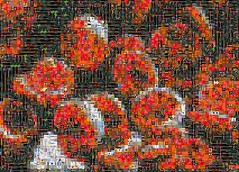Seeing Red

The second of the arguments against a materialistic theory of mind that I'm going to debunk is based on an article by Frank Jackson, "What Mary didn't know".
In it, there is a colour scientist, Mary, who has a full materialistic account of colour processing available, she knows everything there is to know about that. But she has lived in a black and white environment all her life. Now Mary is for the first time taken out of that environment and shown something red, the above mosaic of red blood cells, for example. Now, Jackson argues, she knows something she did not know before: she know what it feels like to see something red. Since we have assumed that she had a full materialistic account of colour vision, the quality of seeing is not included in that account. Thus, there is more than said account. QED.
Which, of course, more often than not stands for Quod erit demonstrandum - somthing that should be proven, but isn't.
Let's look at the argument in some detail, to see where it might go wrong. What exactly is it that Mary has learned when she sees the red? Specifically, if we asked her, could she tell us what it is she has learned? Alas, she could not. Anything about the experience of seeing red that she could describe in words - say if the experience suggested warmth to her - would necessarily be part of what she knew before. Remember? She knows everyhting there is to know about colour vision. She knows what happens when coloured light hits the retina, she knows how it tickles the brain, and what associations and processes are caused by it. She would even have known what it felt like to see red - in the theoretical meaning of the words, where she can deduce the causal consequences and side effects of such a feeling.
The only thing she can be said to have gained by being shown the mosaic, is the actual experience. But just as in the case of the bat, where being a bat is not a legitimate part of a theory of the bat's mind, an experience is not something that can or should be part of the theory of mind. The theory should of course describe the experience in all detail and consequence. But it need not, and cannot, contain that experience, nor cause it.
In other words, after looking at the mosaic Mary's brain is in a state it has not been in before, but which she indeed knew everything about beforehand (which in itself is probably impossible, but that's beside the point here).
To require colour vision theory to contain actual brainstates is just as silly as to claim that hydrodynamics is incomplete, because there is no actual physical glass of water in it.


2 Comments:
Indeed, color vision theory cannot contain "actual brainstates" as you put it. But that is beside Jackson's point.
His point is that there is something about the experience which cannot be encoded in any way. The phenomenology cannot be put into words or any other means of sharing between minds.
You are correct that once she has seen red, she cannot "tell us what it is she has learned." Where your argument trips is when you say "Remember? She knows everything there is to know about colour vision." The "know" here is different than Jacksons's. Jackson began that she knows everything there is to communicate about color vision. And now she knows an experience of color vision which she could not have acquired before, because it's not communicable.
While I don't take Jackson's argument as a proof against materialism, I don't take your argument as any challenge to his. Indeed, it seems to confirm his point.
12:30 PM
Thanks very much for these comments.
I admit that I'm not an expert on Jackson, I've been presented with his argument recently by Searle, and he construed it as an argument against materialism, as which it certainly doesn't work.
I do agree that there is something about experiences that is not communicable and private, but I don't see that it is of any consequence - after all, it is not communicable, so by definition can't be described. Maybe I should go back to Jackson's paper, to see what he was aiming to get out of it. As far as I see, theories in principle and by definition can't reproduce what they describe, so it's not a shortcoming of a particular theory, nor of theories in general that they don't contain the experience.
To me, it seems that all that says is that theories are ontologically different from the things they describe, and that is only surprising, because in the theory of mind, the same processes that the theory describes are the ones employed in comprehending the theory, so confusion can arise.
To go back to my analogy, physics does not contain anything wet. But that's not a shortcoming of physics, nor of theories. It's the difference between thing and description.
No?
1:08 PM
Post a Comment
<< Home